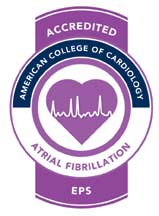
To achieve Atrial Fibrillation Certification
McLaren Macomb has demonstrated high expertise in key areas including:
- Emergency department integration with emergency medical services
- Emergency assessment of patients with atrial fibrillation
- Risk stratification of the atrial fibrillation patient
- Treatment for patients presenting to the emergency department in atrial fibrillation
- Personnel, competencies and training
- Process improvement and organizational structure and commitment
- Atrial fibrillation discharge criteria from the emergency department, observation services, or inpatient stay
- Atrial fibrillation patient education in the emergency department, observation services and inpatient unit
Nearly 3 million patients in the United States have atrial fibrillation and the numbers are rapidly increasing as our population ages.
Atrial fibrillation is the most common cardiac arrhythmia and has become recognized as a health concern that in some cases can lead to stroke and in some people, causes chest pain or heart failure, especially if the heart rhythm is very rapid. An arrhythmia is a problem with the rate or rhythm of the heartbeat. During an arrhythmia, the heart can beat too fast, too slow, or with an irregular rhythm. AF occurs if rapid, disorganized electrical signals cause the heart's two upper chambers -- called the atria (AY-tree-uh) -- to fibrillate. The term "fibrillate" means to contract very fast and irregularly.
As the only facility in Michigan to receive Atrial Fibrillation Certification from the Society of Cardiovascular Patient Care, McLaren Macomb demonstrates its' ability to provide the highest quality cardiovascular care. Our expertise allows McLaren specialist to evaluate and manage the atrial fibrillation patient more effectively, improve patient outcomes, and educate patients and health care providers to more efficiently care for patients with this disease.
McLaren Macomb's protocol-driven and systematic approach to patient evaluation and management allows physicians to reduce time to treatment and to risk stratify patients to decrease their length of stay in the emergency department and the hospital.
We collaborate with referring and primary care physicians to ensure the best possible outcomes.
If you would like more information please visit one of the following websites.
PCNA Fact Sheets and Education
The Beat Goes On Living with AFib - English
El ritmo continúa Viviendo con FibA - Spanish